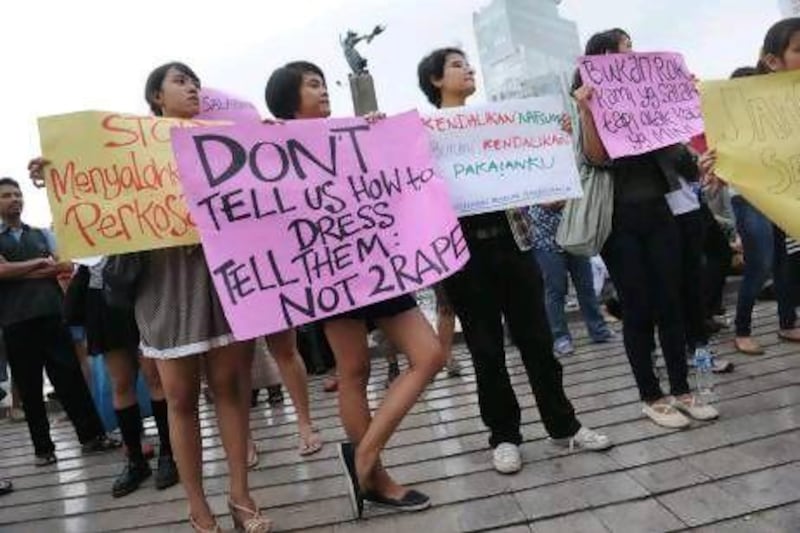JAKARTA // A plan to ban mini-skirts in Indonesia, the world's most populous Muslim nation, has drawn the ire of women's groups and human-rights organisations.
The religious affairs minister, Suryadharma Ali, wants to draw up "a set of universal criteria" on what constitutes pornography, "one of which will be when a woman wears a skirt above the knee".
Mr Suryadharma heads a new task force set up to enforce a tough anti-pornography law drafted by Islamic parties in Indonesia's ruling government coalition. His comments follow a threat by the parliamentary speaker, Marzuki Alie, to ban female politicians from wearing short skirts, because "you know what men are like - provocative clothing will make them do things".
Mr Marzuki added: "There have been a lot of rape cases and other immoral acts recently, because women aren't wearing appropriate clothes."
The debate about hemlines - which began last year, when the governor of Jakarta, Fauzi Bowo, blamed a spate of rapes in public minivans on miniskirts worn by victims - has highlighted tensions between conservatives and liberals in Indonesia.
While most people practise a relaxed version of Islam, the archipelago is home to a wide diversity of cultures and religious interpretations. In the devoutly Muslim province of Aceh, known as the "verandah of Mecca" because the religion first entered Indonesia there centuries ago, hijabs are compulsory for women.
One district of Aceh has since 2010 prohibited women from wearing tight trousers. On the main island of Java, they wear everything from cut-off shorts and tank tops to hijabs and abayas.
Nationally, conservative forces have been in the ascendant recently, and the 2008 anti-pornography law, which survived a Constitutional Court challenge, is their most concrete achievement.
The law stipulates a maximum penalty of 12 years in prison for "pictures, sketches, photos, writing, voice, sound, moving picture, animation, cartoons, conversation, gestures, or other communications shown in public with salacious content or sexual exploitation that violate the moral values of society".
Although condemned as draconian and discriminatory, it has already been used in high-profile prosecutions, one of which led to the imprisonment last year of a pop star, Nazriel "Ariel" Irham, for making two sex tapes that found their way on to the internet.
The president, Susilo Bambang Yudhoyono, who announced the task force last month, has been accused by critics of trying to distract attention from a corruption scandal gripping his ruling Democratic Party, and from an unpopular plan to raise subsidised fuel prices - temporarily shelved following nationwide protests.
One opposition politician, Rieke Dyah Pitaloka, from the Indonesian Democratic Party of Struggle, told the Jakarta Post that the government should be focusing on more important issues. "The way women wear their skirts, below or above the knees, will not impact others," she said.
One of the country's main women's groups, the National Commission on Violence Against Women, has denounced the proposed ban as absurd and repressive.
One of the commissioners, Nurherwati, said it bolstered the still common perception in Indonesia that rape victims were to blame for their ordeal.
The pornography law, she said, was "supposed to protect women, but it actually criminalises them". Ms Nurherwati gave the example of a striptease dancer in Bandung, West Java, who was prosecuted under the law, although she was a trafficking victim. When women reported sexual assaults, she said, "the first thing police ask is, 'What did you do to get raped?'"
Ordinary Indonesians are divided about the idea of a miniskirt ban. Some women have mocked it by hitching their skirts down below their knees - thus exposing their midriffs. "Politicians seem to think their only job is to regulate the skirt length, rather than doing things that are really important, like improving education and creating economic opportunities," said a 39-year-old woman who works for an NGO.
"Men can wear whatever they want; why can't women?"
In the Ramayana department store in Koja, a densely populated district of north Jakarta, the uniform for female sales assistants is a tight black miniskirt, teamed with a burnt orange tunic and high heels. That, presumably, will have to change if Mr Suryadharma gets his way.
One of the assistants, 30-year-old Desi Susanti, said: "I don't think miniskirts cause violations of women. It's down to the character of the individual men."
However, Rani, a 39-year-old shopper, said: "If you wear a miniskirt in the house or at the swimming pool, that's OK, but in the street it's not good."





